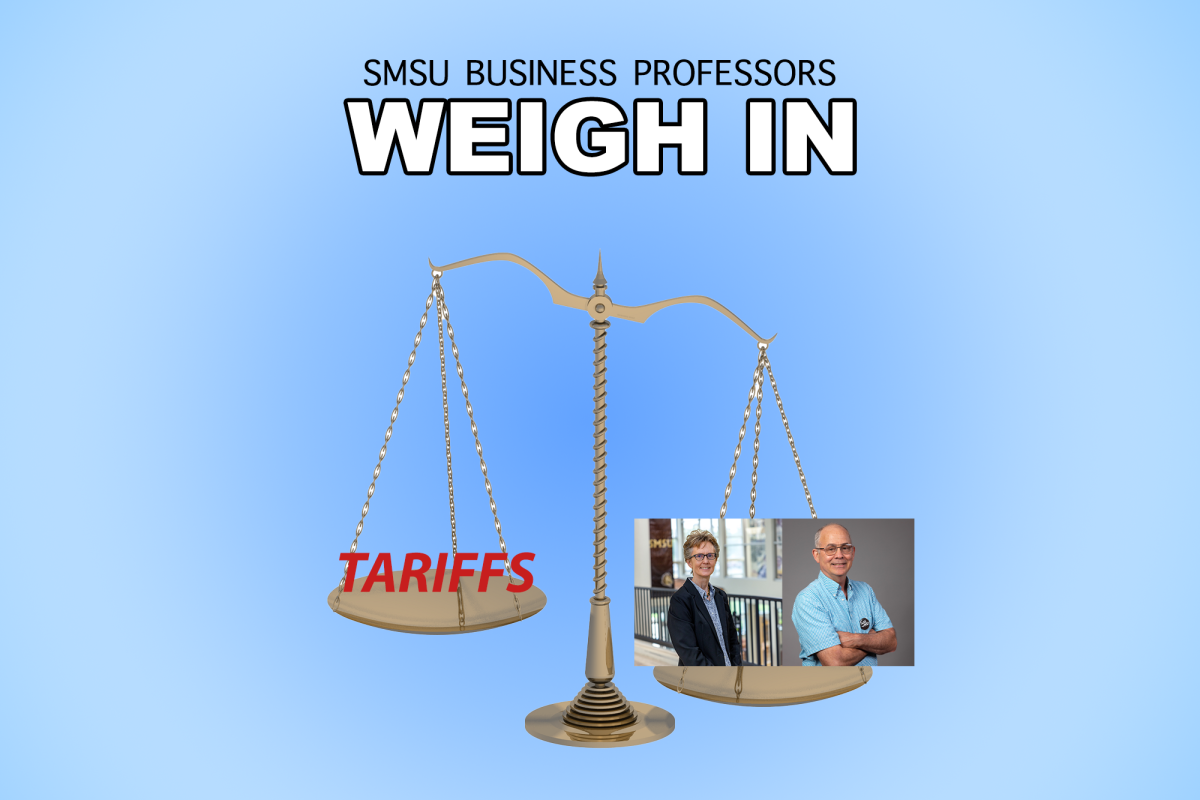Trump had a specific formula for announcing the tariffs. According to CNBC, the tariff formula took the trade deficit and divided it by the imports from that country.
The Mustang Buzz reached out to three professors to ask how tariffs affect SMSU students. Steve Davis, Professor of Agribusiness Management said “I thought President Trump was taking on too much. His first term showed that trade wars are not ‘easy to win’ unless you are comparing them to land wars in Asia. Tariffs reduce overall well-being and are an expensive way to create jobs.”
As an expert in agribusiness management, Davis doesn’t think Lyon County won’t be affected much. “The year [SMSU] got money for the football stadium, the project was delayed a year because the contractors couldn’t get ahold of the steel girders that hold the skyboxes up. Delays like that will get blamed on tariffs, but they happen anyway.”
He added that farmers are already planning to plant more corn, [which goes into] E85, and less soybeans that often [were sold] to China.”
Asked what people should know or plan for as the tariffs take effect, Davis joked, “It’s already too late to stock up on knickknacks from TEMU. Hopefully the [college] Deans know to get their next Mercedes ASAP. But for the people who have a Dodge and a Chevy, just remember to change your oil every 6,000 miles and rotate your tires. Very little is going to get cheaper with tariffs, that’s for sure”
Assistant Professor of Management Martha Grimes-Rose explained price increases further. She is a professor in the North Star Mutual School of Business Supply Chain Center of Innovation and Entrepreneurship. Supply chain management means how businesses are able to distribute products and services.
“Tariffs are essentially taxes on imported products. They can have a huge impact on trade and our economy. Tariffs can lead to higher prices on imported goods, which in turn may result in reduced consumer spending and higher costs for businesses. The end result of this could be a slowing of economic growth,” she said.
Grimes-Rose added that it may be harder to get goods to consumers. “The other potential downside of tariffs is it can disrupt global supply chains, which could lead to shortages and delays in availability.”
Professor Davis agreed that international students will face a different experience than regional students. “Students thinking of traveling abroad will find it more expensive (and maybe less friendly, but that’s not economics),” he said.
But Davis said he didn’t think the international student experience would change much. “If you live like I did at college, you might be eating Hy-Vee mac and cheese instead of ramen noodles,” joking that he has a book on the history of ramen noodles his office.
Grimes-Rose had a different perspective. “SMSU Students would likely see higher prices on anything that is imported. “Things like electronics, clothing and hard copy textbooks cost may increase. Naturally, this could be an extra cost to the student’s budget and increase the cost of an education.”
Students that rely on technology might find it to be more expensive to upgrade their devices,” Grimes-Rose said, although she noted that the Trump administration had made some exceptions for certain electronics like semi-conductors and data processing equipment.
“Businesses that rely on imported goods may face higher costs, which could lead to higher prices for consumers and lower profit margins for the business. This can impact the overall economic health of our region.”
She said agriculture is somewhat vulnerable to tariffs, as a lot of farm inputs and equipment is imported. “Higher costs can impact the farmers profits and could lead to higher food prices,” Grimes-Rose said.
The supply side expert acknowledged that even though tariffs are somewhat like a tax, there are reasons tariffs exist. Among these is whether consumers want to buy U.S. made products.
“U.S. businesses face higher labor costs than many global competitors, which makes it hard to compete on price. Tariffs raise the cost of imported goods, making U.S.-made products more competitive and supporting American jobs,” Grimes-Rose said.
She added that for some products, especially those tied to national security, it’s important to keep manufacturing in the U.S. She said tariffs can help make that possible.
“The U.S. imports more than it exports. Tariffs are one way to encourage more domestic production and reduce our reliance on foreign goods,” Grimes-Rose said.
Businesses can take some steps to reduce the impact of tariffs. “Simple answers include diversifying the suppliers that provide an item, strategic inventory management to help buffer against price increases and supply disruptions. Taking the minutes to do scenario planning to anticipate potential outcomes and prepare for different potential levels of tariffs.”
Finally, the professor said people need to stay aware, to lessen the impact on their lives, and navigate through changes related to pricing or sourcing.
“In general, your finances matter. Stay informed and be proactive where you can,” Grimes-Rose said.



